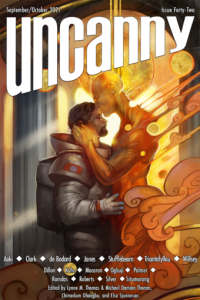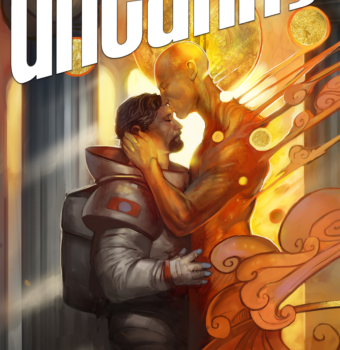Rich Horton Reviews Short Fiction: Asimov’s, Uncanny, and On Spec
 Asimov’s 9-10/21
Asimov’s 9-10/21
Uncanny 9-10/21
On Spec 6/21, 9/21
Greg Egan’s “Sleep and the Soul” (Asimov’s 9-10/21) is an intriguing piece presented as an alternate history where the Jonbar point is a biological change, not a historical one. Humans in this world do not need to sleep and, at least in the 19th-century US in which the story is set, sleep is regarded with horror because the loss of consciousness is presumed to imply that the person who goes to sleep has died and the person who wakes is soulless. (This is tied to Jesus surviving three days on the Cross without falling asleep.) The protagonist, Jesse, loses consciousness due to an accident at work and is buried, but wakes and is able to escape his grave. However, his fellow villagers, including his family, do not accept him as “real,” and he has to run away to New York, and take a false name, with only his fiancée believing in him. He is inevitably discovered, and he is left with a harsh choice – become a sort of sideshow attraction or join a movement that aims to fight the prejudice against those who do sleep. As ever, Egan’s logical working out of the consequences of his central idea is fascinating, and the story is involving, as Jesse’s movement is presented as a fairly open analog to the 19th-century abolitionist movements. Jesse’s story is not resolved here – either because the author felt the most crucial points already made, or because there will be sequels. (I would welcome such!)
I was also impressed by “An Arc of Electric Skin” by Wole Talabi. It’s told by a scientist, who was working on an experimental treatment called “bio-annealing,” which has dangerous effects that aren’t clear until the end. A man, the narrator’s lover, volunteers for the treatment, and only slowly do we learn his reasons, leading to a searing conclusion. It’s a powerful story of political despair and how this drives one person to a terrible sacrifice…. I believed in the politics and I believed in the characters, but I did have a hard time buying the SFnal conceit at the heart of things.
Finally, Elizabeth Bear contributes a sequel to her outstanding earlier story, “In the House of Aryaman, a Lonely Signal Burns”. “A Blessing of Unicorns” is, like the earlier story, a murder mystery set in India, decades from now in a somewhat hopeful future, as a supernova haunts the sky, following a last message from the aliens who lived in its orbit. This features the same two cops, Ferron and Indrapramit, this time dealing with the disappearance of a young social media “effectualizer.” It looks like a serial murder case, as another effectualizer had disappeared a few weeks before, and a third seems threatened…. The murder mystery itself is effectively handled, but it’s less interesting than the background – bioprinted pets and Ferron’s mother issues. Good work, though lacking the aching science fictional impact of its predecessor.
Uncanny for September-October opens with Aliette de Bodard’s “Mulberry and Owl”. It is 20 years after a failed rebellion against the Dragon Throne, and Thuỷ remains haunted by her friend Kim Lan’s death, just as the old Empress died and the new Empress offered amnesty to the rebels. So she has travelled to the Mulberry Nebula, to offer her repair services to the disabled warship The Owl with the Moon’s Tongue – which had served as the Empress’s enforcer against the rebels. At least the Owl can prove her friend’s innocence…. This is fine work, in the end examining the tangled motives of Kim Lan, Thu, and even the Owl, as a surely noble endeavor failed against overwhelming force, leading to something like betrayal. There are no miracles to be found, no true redemption – just a way forward in an unfair world.
The truly marvelous piece this time in Uncanny, though, is “If the Martians Have Magic” by P. Djèlí Clark. This is a radically reimagined take on The War of the Worlds, set long after the end of the first Martian invasion (and two that followed), repelled with the assistance of magic. Minette is a researcher working with some captive Martians who has established a true rapport with them. Now she comes to a conference – the Council on Magical Equilibrium – to plead for the acceptance of the Martians as magic users. This is lovely stuff, a delirious melding of science fiction and otherworldly magic, not to mention politics and bureaucracy. There are surprises at every turn, and I won’t reveal them; just say that this piece succeeds on every level – the science fiction is cool, the magic lovely, the intrigue intriguing, and the personal complications involving. One of the stories of the year.
Issue 116 of On Spec is highlighted by another of Julia August’s delightful collections of fantastical vignettes, “The Opportunity Cost of Adventure”, subtitled “Unsent Emails from Stephen Greenwood’s Drafts Folder”, in which the unfortunate (we assume!) Professor Greenwood outlines his planned dangerous investigation into certain arcane matters, leading to his unfortunate failure to attend some professional conferences.
Halle Gulbrandsen’s “Little Wild Girls” is the most interesting piece in On Spec #117. In the world of this story, girls are truly wild, almost like werewolves. As they turn 19, all that changes – their fur falls out, their behavior changes, they morph into what seems to be a caricature of the perfect 1950s wife. Maddy is accompanying her older sister Jasmine on Jasmine’s last trip into the woods before her birthday, and Maddy desperately wishes she could find a way to stop Jasmine’s impending change. The central metaphor really works, representing, as Gulbrandsen puts it in an interview, “gender roles and the way society expects women to conform.” The story itself is well-written, and Maddy, at least, jumps to life. I did find the central idea just a bit too tidy – the worldbuilding somewhat unfinished – but I’d be fascinated to see further developments.
Recommended Stories
“A Blessing of Unicorns”, Elizabeth Bear (Asimov’s 9-10/21)
“Mulberry and Owl”, Aliette de Bodard (Uncanny 9-10/21)
“If the Martians Have Magic”, P. Djèlí Clark (Uncanny 9-10/21)
“Sleep and the Soul”, Greg Egan (Asimov’s 9-10/21)
“Little Wild Girls”, Halle Gulbrandsen (On Spec 9/21)
“An Arc of Electric Skin”, Wole Talabi (Asimov’s 9-10/21)
Rich Horton works for a major aerospace company in St. Louis MO. He has published over a dozen anthologies, including the yearly series The Year’s Best Science Fiction and Fantasy from Prime Books, and he is the Reprint Editor for Lightspeed Magazine. He contributes articles and reviews on SF and SF history to numerous publications.
This review and more like it in the November 2021 issue of Locus.
 While you are here, please take a moment to support Locus with a one-time or recurring donation. We rely on reader donations to keep the magazine and site going, and would like to keep the site paywall free, but WE NEED YOUR FINANCIAL SUPPORT to continue quality coverage of the science fiction and fantasy field.
While you are here, please take a moment to support Locus with a one-time or recurring donation. We rely on reader donations to keep the magazine and site going, and would like to keep the site paywall free, but WE NEED YOUR FINANCIAL SUPPORT to continue quality coverage of the science fiction and fantasy field.
©Locus Magazine. Copyrighted material may not be republished without permission of LSFF.








